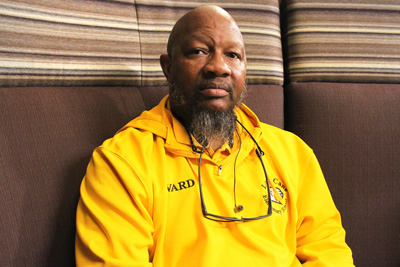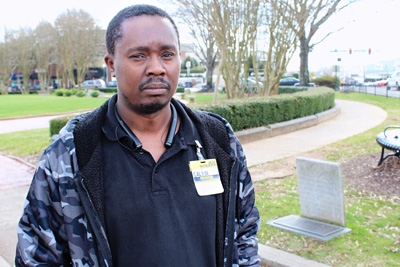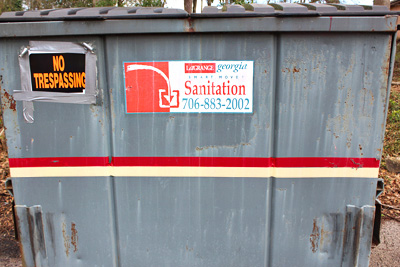
Reginald Mack outside the municipal court in LaGrange. Due to unpaid fines, he’s been unable to open a utility account in his own name in the city.
At an MLK Day celebration in LaGrange, Georgia, a few years ago, a man approached Ernest Ward, then-president of the Troup County NAACP, about his water bill. The man was upset, confused: He said he couldn’t afford the bill from the city because an old court fine he owed had been added on to it. That didn’t sound right to Ward, who wrote it off as impossibly bizarre.
But over the years, the local NAACP kept hearing similar stories, until the organization eventually looked into it and discovered the policy is actually part of acity utility ordinance, and had been in place since at least the early 2000s. LaGrange takes unpaid fines from the municipal court—typically for small violations, such as driving with a suspended license or failure to register a pit bull—and tacks them onto utility bills, using the threat of losing water and electricity to try to get residents to pay.
LaGrange owns and operates its own water, electric, and gas services, which generate a significant revenue surplus for the small city. In an unusual municipal funding arrangement, the city, which has no property taxes, uses this money to pay for other city services.
GET THE FACTS, DIRECT TO YOUR INBOX.
Want more Rewire.News? Get the facts, direct to your inbox.
SIGN UP
The story of LaGrange reeks of the systemic racism in both Flint and Ferguson. Whether it’s framed as a criminal justice issue, a water justice issue, or both, the city’s poorest residents have been living in fear over unpaid fines for years, with many giving up entirely on leasing or owning a home because of their inability to pay, instead living with friends and family or moving to a different town.
In 2017, the local and state NAACP joined Project South, the Southern Center for Human Rights, and seven individual residents of LaGrange to sue the city for discrimination under the Fair Housing Act.
The lawsuit also included a complaint about LaGrange’s treatment of undocumented people, many of whom have been denied utility accounts entirely because the city requires a Social Security number.

Ernest Ward is the former head of the Troup County NAACP in LaGrange, Georgia. Now, he’s an activist speaking out against the city’s court debt policy.
The plaintiffs’ attorneys found 90 percent of the residents subject to the court debt policy were Black (the city’s population is just 48 percent Black), and a 2016 report by theLaGrange Daily News found they largely lived in the segregated Black part of town.
Ward, who is still involved with the local NAACP though he is no longer the president, sees the court debt and utility account policies as an extension of institutional racism—another way the city keeps its Black and brown residents in line. “We live in a society where white supremacy, systemic racism, is alive and well … It’s bigger than just the light bill. It takes a mindset to do such a thing.”
“It’s Just Too Much Smoke”
It’s quiet in LaGrange in mid-winter, and in the early evening on the way into town, there are no sounds but the rushing highway, an hour south of Atlanta. The four-lane into town is lined with strip malls, then stands of pines, then strip malls again—a Hobby Lobby and a Home Depot glowing in the dusk.
At night, you can see stars; this is west Georgia, a city of about 30,000 near the border with Alabama. Some people here commute to work for Duracell and Kia, which both have factories south of town. And there is old money, evidenced in downtown LaGrange’s luscious central square with a brand-new hotel next door. On the rich side of town, there are still lush estates that belonged to the Callaways, the city’s textile moguls of yore.

Calvin Moreland worked extra shifts at Dollar General and Wendy’s to pay off an old court fine that showed up on his water and electric bill. He’s a plaintiff in the lawsuit against the City of LaGrange.
Calvin Moreland is from LaGrange, born and raised, but now lives about a half hour away; he stopped off to meet me in the downtown Marriott lobby after his shift ended at Dollar General. Even as a lifelong LaGrange resident, the 37-year-old says he was surprised when he realized the city was adding his unpaid court fines to his water and electric bill. When he moved into a two-bedroom trailer alone, an old court fine from 2003 showed up; he was confused because he’d done jail time for the charge and didn’t realize he also still owed hundreds of dollars. He negotiated a payment plan with the city, but the bill was so expensive he couldn’t afford to pay his rent and utilities at the same time.
“Some days I didn’t know how I was going to make it,” he said. His landlord ended up discounting his rent for a few months so he could catch up. He worked two jobs, Dollar General and Wendy’s, to pay off the fine, but shortly after that he left LaGrange for good to move in with family. He joined the court case with Project South to make a point about life in LaGrange.
“They need to change that law,” he said. “It hurts a lot of people, especially when people are living from paycheck to paycheck .… They know that you got to have lights, you got to have water, that’s why they add it onto people’s utility bills. I think it’s very wrong.”
Pamela Williams, whose mother is the landlord who gave a discount to Moreland, joined the lawsuit as well, alleging she’s lost thousands of dollars on discounting rent for tenants who owe fines and risk losing water and electric. Williams owns about ten properties in LaGrange, and she says she’s seen it at least 100 times before, mostly in the form of people asking her to put the utilities in her name. She’s also had tenants who’ve gone months without utilities before asking for help.
“The city will tell us that that’s never happened,” she said. (The city has stated publicly that it never actually cuts off water and electricity due to unpaid court fines.) But Williams, and others I spoke to in LaGrange, have seen it over and over. “It’s just too much smoke. The fire is somewhere.”
Fear and Panic in LaGrange
LaGrange is known for running its utilities like a business—a municipal monopoly with a large profit margin. The city has no property tax, only a small sales tax (the most regressive form of tax revenue, meaning the burden falls most heavily on the people with the lowest incomes). The largest single source of revenue for the city is its utility services; the city charges enough for its water, gas, and electric services to run up a significant revenue surplus, and then shifts the cash from those accounts to its general fund to pay for police, street maintenance, and so on.
“Is that unusual? Probably. But it’s not illegal or unethical,” said Michael Pagano, the dean of the College of Urban Planning and Public Affairs at University of Illinois at Chicago, who co-authored a study of municipal funding sources for the Brookings Institution.
Many cities around the country have been struggling to find an effective revenue model as state governments and the federal government cut municipal funds. Depending on state law, cities can levy property, income, or sales tax, or they can depend on fines, fees, or charges for services. The Ferguson uprisings years ago put a spotlight on the injustice of funding municipalities through court fines, an approach that puts a disproportionate burden on low-income, Black residents.
The lawyers for the plaintiffs in the lawsuit say denying people water and heat is an extreme form of injustice. The Fair Housing Act, they argue, was designed to protect from exactly this kind of discrimination—policies that have the effect of keeping people of color out of rental and ownership opportunities, regardless of the stated intent of the policy. And, they say, LaGrange punishes whole families for nonpayment on the part of just one family member.
“The fear and the panic is palpable for people who are in danger of losing their power, losing their water, losing other utilities,” said Atteeyah Hollie, an attorney with the Southern Center for Human Rights.
LaGrange officials declined interviews for this story, referring me to the city’s attorney, Jeff Todd. In a written statement, Todd defended the debt collection policy: “As the city has stated in its court filings, the mayor and council are stewards of public funds, have an obligation to collect lawful debts owed the city, and the collateral debt policy is just one of many methods used to protect the financial stability of the city. The city is defending the policy because it is a valid and lawful tool, an assessment with which the District Court agreed.”
In December 2017, a federal judge in Georgia dismissed the lawsuit against the City of LaGrange. The plaintiffs appealed in the 11th Circuit Court of Appeals, which heard oral arguments this past December. The three-judge panel included one new judge appointed by the administration of President Donald Trump, Elizabeth Branch, whose conservative background makes it likely that she’ll try to stick to a close, and limited, reading of the Fair Housing Act.
The Trump administration has been unusually quick in appointing new appeals court judges, which can have a huge effect in cases like that of LaGrange, where local policy often depends on federal intervention.
“Nothing in this community that has enhanced our quality of life as citizens has come to us because it was the right thing to do. It always has taken litigation,” Ward said, citing the long history of federal intervention in segregation and discrimination cases.
Responding to a question about the human rights implications of cutting off utilities over unpaid fines, Todd wrote: “I have seen that city staff works hard to find solutions for those in difficult circumstances, and the city actually has what I consider to be an outstanding track record of meeting true and demonstrated needs when possible. On the other hand, I am sure everyone realizes that at some point a utility system isn’t sustainable without payment for services provided. The City of LaGrange, like all utility providers, has to balance those interests every day.”
While Georgia public records law prohibits the release of individual utility account information, the utility rates alone suggest LaGrange’s system of funding itself through utilities disproportionately burdens low-income people. According to the city’s website, households generally pay higher average rates than commercial and industrial users, with low-income homes likely bearing a heavier burden relative to household income.

In LaGrange, Georgia, many low-income residents live in fear of losing their utilities due to unpaid court fines. Others are unable to get utility accounts at all because of their immigration status.
It’s a highly effective system for LaGrange: The city’s 2019 budget estimates about $1 million in revenue from court fines and probation fees, and around $14 million in surplus from utility services to be transferred into the general fund.
Of these revenues, strangely, the money collected through the court debts rolled over onto utility bills appears to be a tiny droplet: Over nearly three years ending in January 2019, Todd said the city collected just $40,419.70 in fines through that mechanism.
While the benefit to the city is small, the burden for the city’s poor residents can be huge. Poor people in LaGrange live extremely precarious lives, and the city is tossing around their fates for a few dollars at a time in fines.
A few days after my first trip to LaGrange, my phone blew up from an unknown number. “I need to talk to you. It’s very urgent. It’s very urgent,” said the woman in the message. I called her back, and she answered breathless. The woman, Alisha Dawson, had just moved to a new home in LaGrange, with her three-week-old baby and two small kids in tow, and she got my number from someone who said I could help. Her utility bill came with a fee on it that she had no idea about. She sent me a picture of the bill: A deposit, the utility charges for the month of December, and a mysterious fine of $571.97. The whole bill was for $1,033, a number she kept repeating as we talked, incredulous and panicked. The city had given her two-and-a-half weeks to pay in full or see her lights and water cut off.
I couldn’t help, not really, but I let her know that we could at least file a public records request to find out the nature of the tacked-on fines, which appear on her bill with no explanation. I found no records for an Alisha Dawson in the municipal court; only an Alesha Dawson, which the court could not confirm was the same person. When I called her on January 23, Dawson said she’d gone into the utility office and cried; they gave her until February 1, and later February 23, to pay up. After that I stopped hearing back from her. I was struck both by her panic, and by the simple fact that she’d called me, a journalist in North Carolina, hoping I could help. It seemed there was no one she could turn to.
http://bit.ly/2ALkaWZ

 I had to eat that shyt.
I had to eat that shyt. 